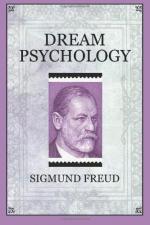But slightly affected by scientific opinion and untroubled as to the origin of dreams, the popular view holds firmly to the belief that dreams really have got a meaning, in some way they do foretell the future, whilst the meaning can be unravelled in some way or other from its oft bizarre and enigmatical content. The reading of dreams consists in replacing the events of the dream, so far as remembered, by other events. This is done either scene by scene, according to some rigid key, or the dream as a whole is replaced by something else of which it was a symbol. Serious-minded persons laugh at these efforts—“Dreams are but sea-foam!”
One day I discovered to my amazement that the popular view grounded in superstition, and not the medical one, comes nearer to the truth about dreams. I arrived at new conclusions about dreams by the use of a new method of psychological investigation, one which had rendered me good service in the investigation of phobias, obsessions, illusions, and the like, and which, under the name “psycho-analysis,” had found acceptance by a whole school of investigators. The manifold analogies of dream life with the most diverse conditions of psychical disease in the waking state have been rightly insisted upon by a number of medical observers. It seemed, therefore, a priori, hopeful to apply to the interpretation of dreams methods of investigation which had been tested in psychopathological processes. Obsessions and those peculiar sensations of haunting dread remain as strange to normal consciousness as do dreams to our waking consciousness; their origin is as unknown to consciousness as is that of dreams. It was practical ends that impelled us, in these diseases, to fathom their origin and formation. Experience had shown us that a cure and a consequent mastery of the obsessing ideas did result when once those thoughts, the connecting links between the morbid ideas and the rest of the psychical content, were revealed which were heretofore veiled from consciousness. The procedure I employed for the interpretation of dreams thus arose from psychotherapy.
This procedure is readily described, although its practice demands instruction and experience. Suppose the patient is suffering from intense morbid dread. He is requested to direct his attention to the idea in question, without, however, as he has so frequently done, meditating upon it. Every impression about it, without any exception, which occurs to him should be imparted to the doctor. The statement which will be perhaps then made, that he cannot concentrate his attention upon anything at all, is to be countered by assuring him most positively that such a blank state of mind is utterly impossible. As a matter of fact, a great number of impressions will soon occur, with which others will associate themselves. These will be invariably accompanied by the expression of the observer’s opinion that they have no meaning or are unimportant. It will




